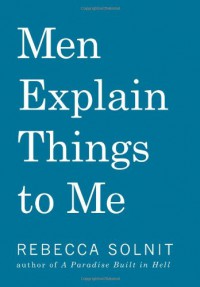Currently reading
Saints in Art
The Gorgeous Nothings: Emily Dickinson's Envelope Poems
Selected Poems
Emily Dickinson
Lies My Teacher Told Me : Everything Your American History Textbook Got Wrong
Gone with the Wind
Men Explain Things to Me
 I didn't know this book was a collection of essays when I first sat down with it. I thought it was an expansion on the title essay. I would have enjoyed this book more if I'd known what to expect, so in case you didn't know, either: this book is a collection of feminist essays.
I didn't know this book was a collection of essays when I first sat down with it. I thought it was an expansion on the title essay. I would have enjoyed this book more if I'd known what to expect, so in case you didn't know, either: this book is a collection of feminist essays. Some of the writing here makes for some pretty brutal reading. Much of it had me jumping up and down, shouting, "YES! FINALLY, SOMEONE ELSE IS SAYING THIS! IT'S NOT JUST ME! THIS IS TRUE!"
Passages like this one:
It's not that I want to pick on men. I just think that if we noticed that women are, on the whole, radically less violent, we might be able to theorize where violence comes from and what we can do about it a lot more productively. Clearly the ready availability of guns is a huge problem for the United States, but despite this availability to everyone, murder is still a crime committed by men 90 percent of the time.
And this one:
No female bus riders in India have ganged up to sexually assault a man so badly he dies of his injuries, nor are marauding packs of women terrorizing men in Cairo's Tahrir Square, and there's just no maternal equivalent of the 11 percent of rapes that are by fathers or stepfathers. Of the people in prison in the United States, 93.5 percent are not women, and though quite a lot of the prisoners should not be there in the first place, maybe some of them should because of violence, until we think of a better way to deal with it, and them.
And so many more. I could quote this book all day. (Ask my friends.)
Solnit points out, correctly, that South Africa is the rape capital of the world. I already knew this, and have been known to point out (again, check with my immediate circle) that we all cared a lot about the horrible things going on in South Africa when those horrible things were racist. Now that it's women who are being brutally mistreated – gosh, look at the time. And anyway, that's not the same thing as apartheid, is it? It's not the government raping women. So, you know.
Excuse me while I punch a wall.
Solnit's chapter "Who has the right to kill you?" has never been more timely. It addresses the idea some men have that they have a right to control women's behavior, and to mete out punishment for "misbehavior." (Misbehavior being behavior such men don't approve of, such as women not basing their actions on what such men want.)
A few days ago, I was listening to a news report about one of the rapists who's facing the death penalty for his murderous assault on a medical student in New Delhi. This rapist was interviewed about his crime, and I was expecting to hear him sound utterly cowed, utterly chastened. He was facing possible execution, after all, for a crime that had prompted outrage around the world. I expected this to be hard to listen to, because I rarely enjoy hearing people cringe no matter how hard they've worked to earn the privilege of doing so.
Instead, he doubled down. He had the right, he said, to teach a lesson to a girl who was out late with a boy she wasn't married or related to. And anyway, he wouldn't have hurt her so much if she hadn't fought back.
Well, I was right about it being hard to listen to.
I want to point out one small fault in this book, because it's a misuse of statistics I've run into before and it drives me nuts and I need it to stop. We can do better, and when it comes to a cause as important and beleaguered as feminism, we need to do the best work possible.
Here's a passage from Men Explain Things to Me that didn't have the intended effect on me:
About three women a day are murdered by spouses or ex-spouses in this country. It's one of the main causes of death for pregnant women in the United States.
The first sentence made me blindingly furious. I wanted to run outside and do something. Shout from the rooftops. Donate to my local shelter. Something. Anything.
The second sentence made me think, "That's true – we've really made a lot of medical advances. Women aren't dying in childbirth, or from pre-eclampsia, or from the side effects of hyperemesis gravidarum, nearly as often as we used to. And that's not what you meant, is it?"
I know I sound like a heartless jerk, but I can't STAND it when people use what I call the Popularity Contest of Doom to make a point that makes itself without any help.
I remember hearing something on the radio years ago about suicide among the very young. Really, you barely need statistics at all if you're going to agitate against that. If one single solitary child is taking her own life, that's one child too many. Take my wallet. Take my chocolate. Do whatever you need to, but make it stop.
This report or ad or whatever it was couldn't stop there. Instead, a woman's voice intoned, "Suicide is the leading cause of death among children aged 9 to 14 in this country."
And I'm sorry, but yes – as a rigorous critical thinker, my first thought was, "Well, YEAH. We've hit the medical causes so hard that suicide has had the chance to catch up."
Solnit said something about how "this is the number one cause of death for women" a few times in this book, and it drove me quietly out of my mind every time. Because what does that mean? Why phrase it that way? If the leading cause of death among pregnant women in America is murder, and then German measles makes a horrific comeback and pregnant women start dying more of that even though the murder statistics didn't change any, are you saying I shouldn't worry anymore about pregnant women being murdered by their spouses and ex-spouses because who cares about the second-place winner in this race from hell?
If you don't mean that, why bring it up at all?
If you have meaningful figures and statistics, give me those. If three American women a day really are murdered by spouses or exes, that's what I care about. That's enough. More than enough. I don't care who else wanted to be queen of the evil prom.
This is a tiny quibble about a book that turned me into the reader everyone dreads – the one who looks up from her page and says, "Let me just tell you this one part" and then makes you late for work by reading aloud for ten minutes straight, pausing only long enough to say, "Isn't that amazing?" before starting in on yet another part that you really have to hear.
Brace yourself to read this book, but read it.








